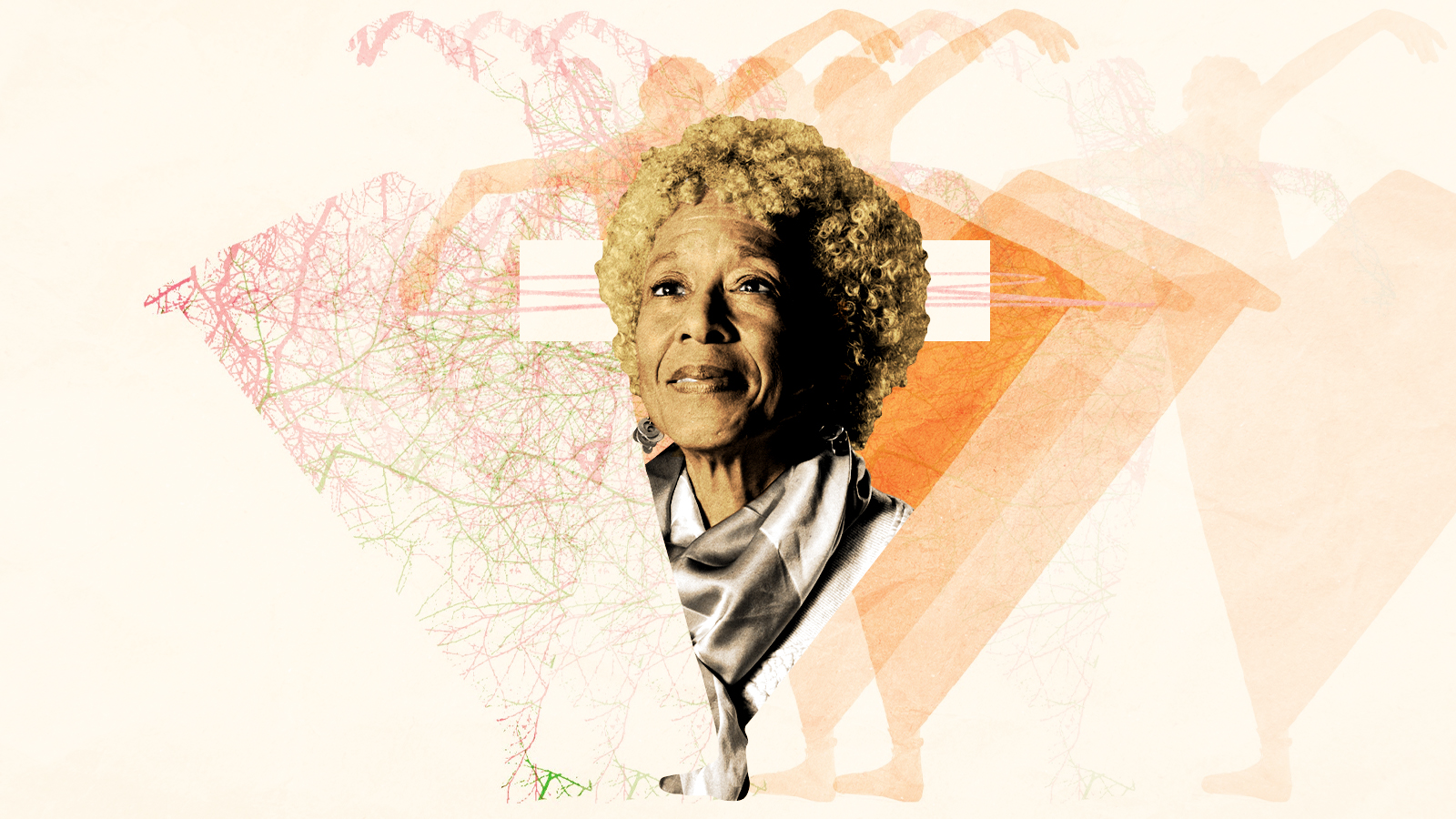The magnificent dance of Margo Jefferson's Constructing a Nervous System
The Pulitzer Prize-winning critic returns with a brilliant memoir on race, criticism, and self


A free daily email with the biggest news stories of the day – and the best features from TheWeek.com
You are now subscribed
Your newsletter sign-up was successful
Don't let the title of Margo Jefferson's new book, Constructing a Nervous System: A Memoir, fool you. By "nervous system," the Pulitzer Prize-winning critic has in mind not just the brute facts of embodied existence — the medulla oblongata and spinal cord — but something more metaphysical. "My nervous system is my structure of recombinant thoughts, memories, feelings, sensations, and words," she writes in the memoir, a follow-up to Negroland, her 2016 memoir about growing up as part of the Black bourgeoisie in Chicago, and making a path for herself as a writer.
The memoir's subtitle also carries an invisible asterisk; as much as it is a memoir, Constructing a Nervous System is equally a "them-oir," to borrow a coinage from the literary critic Alexandra Jacobs. It is as intimately preoccupied with others as it is with the self. There are childhood reminiscences of classmates being casually racist as well as nuanced considerations of works by Harriet Beecher Stowe and Kara Walker. Cultural criticism and autobiography, then, are the two strands of Jefferson's literary double helix.
She has a style supple enough to accommodate both modes. The hallmarks of a typical Jefferson construction are abundantly on display here and will be familiar to readers of Negroland and her 2006 cultural analysis On Michael Jackson: lattice-like associations well ventilated with levity. Whether she is staging an encounter between George Eliot and W. E. B. Du Bois (a fantasia that has all the makings of a stage play) or writing about the sweat-drenched performances of Ella Fitzgerald and Louis Armstrong (feats of "artistic diaphoresis"), Jefferson never sounds like anyone but her dialectical, ensorcelling self.
The Week
Escape your echo chamber. Get the facts behind the news, plus analysis from multiple perspectives.

Sign up for The Week's Free Newsletters
From our morning news briefing to a weekly Good News Newsletter, get the best of The Week delivered directly to your inbox.
From our morning news briefing to a weekly Good News Newsletter, get the best of The Week delivered directly to your inbox.
Every sentence of Constructing a Nervous System gives the reader a sense of a roving, highly individuated consciousness in conversation with itself. Here is Jefferson, warming up to embark on this new project: "You write criticism. You write memoir. What will be your tactics, strategies, instruments for constructing this nervous system?" Then comes the double-barreled reply: "For most of my adult life I'd felt that to become a person of complex and stirring character, a person (as I put it) of 'inner consequence,' I must break myself into pieces — hammer, saw, chisel away at the unworthy parts — then rebuild."
Hammering, sawing, and chiseling away: All are acts of deconstruction and, one might say, of criticism. Not incidentally, the book also serves as an excellent guide for how to write sublime criticism: a critic's ars poetica that is in lively dialogue with other books in the micro-genre like film critic A. O. Scott's Better Living Through Criticism and dance critic Sarah Kaufman's The Art of Grace: On Moving Well Through Life. Jefferson even offers a cheeky modification of Janet Malcolm's delicious provocation of journalists: "Every critic who is not too stupid or full of herself to notice what is going on knows that what she does incites arrogance and hubris. She is a kind of omniscient narrator, preying on readers' vanity, insecurity, and ambition, flattering their taste, sanctioning their beliefs, gaining their trust and betraying them without remorse."
As it is, Jefferson doesn't live down to this idea of a cartoon critic. She suffers no fools, flatters no one's tastes, and delivers gusts of uncompromising prose. Her remit is extremely broad — anything is fair game for her critic's quill. The compliments that she gets at a gym about her toned physique are not airily brushed aside; they must be turned over and examined for ulterior meanings, if not motives, the hermeneutics of suspicion getting a workout. She also writes brilliantly, evocatively of Black male performers like Billy Eckstine, Johnny Hartman, and Bobby Short, who have all served at one point as her "alter egos": "They built kingdoms of tonal and linguistic artifice: words stretched out, sunning themselves in the musical line; consonants slyly dropped then restored without a backward glance; timbres plush and plangent." Almost every page has a line like this that makes you pause, that sews you up in surprise.
There are also more sobering sections on the long reach of anti-Black racism, and how Black Americans "have had to embody grand themes and ideas to gain white society's attention and support." Such a statement seems unimpeachable on its face, yet Jefferson goes about slowly deflating it, deconstructing it. She clarifies that by "Black Americans" she means Black male Americans. Black women have all too often been sidelined by mainstream art and entertainment, cast as "reinforcements, distractions, affect, and justifications." Part of the task of Constructing a Nervous System is to bring Black women in from the cultural shallows, to retroactively restore to them "imaginative compensations." Yet even this leaves something to be desired: Jefferson challenges herself, thrillingly, ambidextrously, to tell "another story, one told by an unsheltered 'I.' No plural here, no 'we' for camouflage."
A free daily email with the biggest news stories of the day – and the best features from TheWeek.com
One of the strongest sections (and they are all strong) braids together a story of this "unsheltered I" with a tour-de-force critique of the expectations heaped on Black female athletes. As an adolescent, Jefferson recounts, she and her sister, Denise, were hungry for female role models. They intuited that negative capability, or the ability to "imagine what hasn't, can't, and won't imagine you," could only take them so far. "Too much of white art requires a negative capability that negates whole parts of one's self," she writes. The sentence properly scorches. The young Margo and Denise cathect to athletes like Lena Horne and Diahann Carroll, even as the display of Black female athleticism "stirred [up] unease and ambivalence — shame — in Black women everywhere."
Unease because of the media's reception of these athletes: The rare celebrations of Black excellence were often tinged with paternalism and racism. Shame because girls growing up in the elite enclaves of Negroland "had to struggle for permission to love sports." Even if one defied parental or societal strictures, even if one fiercely committed oneself to sports, excelled, and broke barriers for Black and white women, what then? There was always the fear that a minor misstep would expose one as a fraud, that "a clumsy gesture, a speech pattern that's too rural, too Black dialect-ical" would "expose some aspect of the inferiority the achievement was supposed to disprove."
This fear hovers in the background as both Margo and Denise take up ballet, the latter with more vim than the former. Defying racialized attitudes about the archetypical ballerina, Denise would go on to become a professional dancer in New York. Yet dance also serves as an artistic induction for Margo, exposing her to the "world of theater and meticulous artifice." Nervous System, at its best, resembles dance: a spine-tingling pas de deux for memory and culture, with not a movement wasted. When we reach the last page, we are ready for an encore.
Rhoda Feng is an editor and freelance writer who splits her time between New York and Washington, D.C. She has published or forthcoming work in 4Columns, The Baffler, BOMB, The White Review, The Hedgehog Review, Paris Review Daily, The Atlantic, The Guardian, the Los Angeles Review of Books, Salon, Brooklyn Rail.
